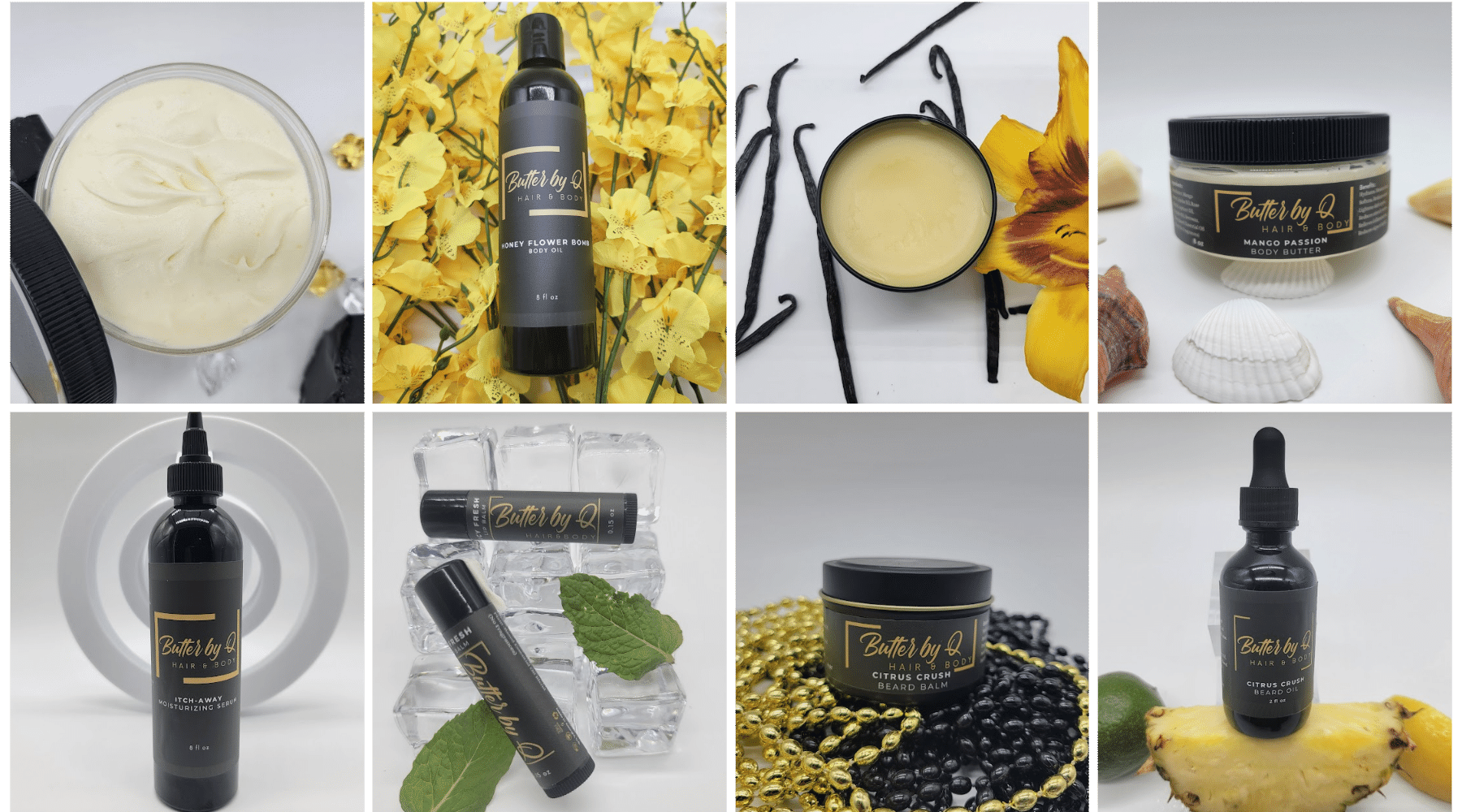Guide to Natural Plant-Based Cosmetics vs Synthetic Skin Care Products
Table of Contents for Guide to Natural Plant-Based Cosmetics & Skin Care Products
- What Are Traditional or Conventional Cosmetic & Skin Care Products?
- What Are Natural Skin Care Products?
- What Are Plant-Based Skin Care Products?
- What Are Vegan Cosmetics & Skin Care Products?
- What's the Difference Between Plant-Based Skin Care Products vs Natural Beauty Products
- Are Plant-Based & Natural Beauty Products Really Better?
- The Natural Skin Care Industry Growth
- Natural Black Skin Care & Hair Care Products Are Becoming More Prevalent
- What Are Common Dangerous Chemicals Used in Conventional Skin Care & Cosmetic Products
- What Is the Best Plant-Based & Natural Skin Care?
Your skin is your body’s largest organ, but it's tasked with more than helping you attain a youthful glow (while important). Your skin acts as your body's first line of defense against germs, prevents excessive water loss, helps with temperature regulation, detects infections, reduces harmful effects of UV radiation, and much more.
However, cycling through the plethora of choices and names in the natural beauty world is often easier said than done. For clarity, we’ve created a comprehensive guide to plant-based, natural, and vegan skin care products. Let’s take a closer look at these products and the unique benefits natural plant-based cosmetics can offer you.
What Are Traditional or Conventional Cosmetics & Skin Care Products?

For several years, cosmetic manufacturers have created conventional skin care products and cosmetics. This vast and expansive category of products includes products made with ingredients that pass for cosmetic use by law.
As we all know, just because it’s legal doesn’t mean it’s a good idea or good for you —i.e. marrying your first cousin is legal in at least 25 states. In fact, many of these products are made with cancer-causing chemicals, hormones, and substances that trigger allergies.
What Are Natural Skin Care Products and Cosmetics?

While natural skin care products may sound straightforward, they can be a convoluted topic. This can make it difficult to differentiate truly natural skin care products from conventional products.
Natural skin care products are those made with natural ingredients, such as shea butter, beeswax, jojoba oil, water, etc. The majority of experts would agree that natural skin care products are those that are free from:
- Parabens
- Dyes
- Synthetic fragrances
- Phthalates
Instead of these potentially dangerous chemicals, natural skin care products are sourced naturally and use botanical ingredients known to have more therapeutic effects on the skin.
What Are Plant-Based Cosmetics and Skin Care Products?

Plant-based skin care products or plant-based cosmetics are a more refined sector of natural products. As the name suggests, plant-based beauty products are created with ingredients derived from plant origins. These plants and botanicals can be:
- Fruit
- Vegetables
- Nuts
- Seeds
- Whole Grains
- Legumes
- And more
Beware of “Green Washing” Fake Natural Plant-Based Products
Just because a product says "plant-based" doesn’t guarantee most of the ingredients are derived from plants or botanicals. To truly distinguish between plant-based vs traditional cosmetic products, you must pay attention to the label.
In many instances, manufacturers bring their plant-based ingredients to the forefront to market the skin care product as “green.” Upon closer inspection, you may notice only a small portion of the ingredients are plant-based.
The remaining ingredients commonly stem from the same chemicals and potentially toxic ingredients used in traditional cosmetics. This is a process some call “greenwashing.”
One common example is when manufacturers use chemical fragrances to add an aroma to their products. Even if other ingredients are plant-based, artificial and chemical fragrances can introduce the harmful substances you want to avoid. The best solution is to select products that use extracts from raw plant materials or natural plant oils.
What Are Vegan Cosmetics & Skin Care Products?

Another popular category of skin care products and cosmetics are vegan products. While the name suggests these products should be at the top of the purity chart, this isn’t always the case. More so, just because cosmetics and skin care products are vegan doesn’t mean they are of natural origin.
Vegan Cosmetics and Skin Care Products May Have Artificial Ingredients
Contrary to popular belief, vegan beauty products may include several chemicals and artificial ingredients regularly used in conventional cosmetic products. However, vegan skin care products should not have:
- Animal-derived ingredients, such as collagen, cholesterin, and gelatine, or
- Animal byproducts, such as milk, beeswax, or honey.
Are All Vegan Cosmetics and Products Cruelty-Free?
Cruelty-free products mean that no phase of production involves testing on animals. Because of this, cruelty-free products are not necessarily vegan. For example, a product with milk or honey can be cruelty-free, but this same product would not be classified as vegan.
What’s the Difference Between Plant-Based Skin Care Products vs Natural Cosmetics and Beauty Products?

When it comes to plant-based skin care products vs natural skin care products, there is a difference. Plant-based beauty products are derived primarily from botanicals and plants. Natural skin care products may contain animal-derived ingredients.
For example, products with lanolin can't be plant-based. This is because lanolin is extracted by placing the sheep’s wool through a centrifuge machine that separates the valuable lanolin oil from other debris and chemicals.
Most lanolin extraction processes are cruelty-free because the extraction occurs after the wool has been cut. In contrast, plant-based products tend to have a high percentage of plant-derived ingredients. While they may differ in this arena, plant-based cosmetics and natural skin care products should all be free of the following
Natural Plant-Based Products Are Devoid of Chemicals

Undoubtedly, plant-based and natural products should be devoid of potentially harmful chemicals, such as:
- Parabens
- Dyes
- Synthetic fragrances
- Phthalates
Natural Plant-Based Products Are Devoid of Synthetic Fragrances
Synthetic fragrances are composed of chemical compounds that work to replicate natural fragrances. Some synthetic fragrances may include both chemicals and natural materials, or synthetic fragrances can be 100% synthetic.
In contrast, true natural and plant-based products are made from natural raw materials and plant-based fragrances. Many synthetic fragrances are petroleum-based and can be very harmful to your health. Chemicals commonly found in synthetic fragrances include:
- Carcinogens benzophenone and styrene
- Phthalates, which are endocrine disruptors
- And other dangerous chemicals
Many people with eczema, psoriasis, and sensitive skin can be allergic to fragrance chemicals.
Are Natural Plant-Based Cosmetics Really Better?

In most instances, the answer is a resounding yes: plant-based and natural skin care and cosmetics products are better. Here are a few reasons why.
Natural Plant-Based Cosmetics Are Antioxidant Rich
Many plant-based and natural products are loaded with antioxidants. These powerful substances can help to strengthen and restore your body’s cells by fighting off free radicals. Free radicals are unstable atoms that contribute to aging and can damage cells.
Natural Plant-Based Cosmetics Have Added Vitamins
The vitamins commonly found in plant-based skin care products boast the ability to help maintain your skin. These vitamins are also highly effective at supporting cell repair and helping to reduce signs of aging. In addition, plant-based products are jam-packed with minerals and nutrients that are key to healthy and luscious hair.
Plant-Based Natural Cosmetics Have Essential Fats & Acids
Essential acids and fats can provide a vast range of benefits for your skin, such as:
- Increase skin elasticity
- Smooth out scars
- Reduce oiliness
- Fight skin dryness
- Calm acne
- And more
Plant-Based Beauty Products Have Natural Esters & Lipids
Natural esters and lipids can help support your skin’s natural defense barrier to protect, smooth, and repair. These substances are used as conditioning agents and emollients that work to keep your skin hydrated and healthy.
The Industry Growth of Natural Plant-Based Cosmetics

Whether you visit your local pharmacy or Walmart, you will notice the proliferation of natural beauty cosmetics and skin care products. And this comes as no surprise. The natural skin care product industry is projected to skyrocket and nearly double to $12.27 billion from 2021 to 2030 based on research performed by Brainy Insights.
Much of this growth can be attributed to increased research on the impact of ingredients used in conventional products. And now couldn’t be a better time, especially for Blacks and African American products.
Natural Black Skin Care & Hair Care Products Are Becoming More Prevalent

Although everyone with skin or hair should be concerned about what they put onto their bodies, this issue is critical for African Americans and Blacks. Based on research by the National Institutes of Health, women who used hair straightening products exhibited a noticeably higher risk of developing uterine cancer when compared to women who didn’t use hair straightening products. The Sister Study included 33,497 women aged between 35 - 74 that were tracked for almost 11 years.
During this period, there were 378 instances of a uterine cancer diagnosis. The women who reported more regular use of hair straightening products — over four times in the previous year — were two times as likely to develop uterine cancer.
Alexandra White, Ph.D. and Head of the National Institute of Environmental Health Sciences (NIEHS) estimates that approximately 1.64% of women who have never used hair straighteners would develop uterine cancer by 70. This percentage exponentially increases to 4.05% for women who identify as frequent hair straightener hair.
Even more alarming, around 60% of the women in the study who reported using hair straighteners self-identified as Black Women. This makes the negative and potentially life-threatening effects of using hair straighteners even more significant for African American and Black women because we tend to use straighteners more often.
Although researchers didn't collect data on the specific brands or ingredients in the hair straightening products, they did note chemicals found in these products that may contribute to increased uterine cancer:
- Parabens
- Bisphenol A
- Formaldehyde
- Metals
The effects of chemical exposure may be even more troublesome for hair straightening products compared to other cosmetics because of the higher rate of scalp absorption. The rate of absorption can be increased due to lesions and burns often caused by straighteners.
Because of this new reality, more and more African Americans are turning to natural black skin care and hair care products.
What Are Common Dangerous Chemicals Used in Conventional Skin Care & Cosmetic Products

By now, you’re probably wondering, “Why are natural and plant-based skin care products so appealing, anyway?” As the number of people and children being diagnosed with eczema increases, more people are becoming aware of the ingredients in their skin care products.
They are also becoming aware of the potential hazards and skin irritation associated with harsh chemicals and additives. Some of the most hard-hitting and common additives in skin care products that can be hazardous to your health include the following.
What Is Petrolatum? Is Petrolatum Bad for Skin? Is Petrolatum Safe?

Petrolatum is a byproduct of petroleum jelly. When petroleum is refined properly, it has no known health concerns. However, this is often not the case in the US. Petroleum is often contaminated with polycyclic aromatic hydrocarbons (PAHs), which are potential carcinogens.
Despite the risk and potential dangers, petrolatum is regularly used in conventional skin care products. If you have high exposure to PAHs, it can increase your risk of breast cancer. To avoid this, you should look for products, such as lip balm without petrolatum.
What Are Parabens? Are Parabens Bad?
Parabens are preservatives commonly used in skin care products. Because cosmetics and skin care products have ingredients that can biodegrade, parabens are added to increase shelf life and prevent the growth of mold and bacteria.
However, many scientific studies suggest parabens have a nasty suite of side effects. Parabens are believed to:
- Disrupt bodily hormones and negatively impact reproductive organs and fertility
- Affect birth outcomes
- Increase the risk of cancer
- Cause skin irritation
You will be more likely to find parabens in water-based products. Fortunately, major retailers are taking steps to place active bans or restrictions on products with parabens. For instance, Whole Foods Market bans four different parabens as a component of its premium body care standard. At the same time, CVS has committed to removing parabens from its store brand products.
Alcohol-Based Ingredients Can Dry Your Skin Out

If alcohol is one of the top ingredients in your favorite skin care product, it can be extremely drying. With longtime use, alcohol can disrupt your skin’s barrier and facilitate the escape of moisture while allowing potential irritants into your skin. And this can lead to more inflamed skin as well as redness.
What Are Phthalates? What Products Have Phthalates?

While phthalates are banned from cosmetic use in the European Union, they are prevalent throughout the United States in skin care products, such as:
- Perfumes
- Nail polish
- Deodorants
- Shampoos
- Body lotions
- Hair sprays
- Soaps
- Hair gels
- Shampoos
Products with phthalates may cause endocrine disruption, cancer, and developmental and reproductive toxicity.
According to a Harvard study, exposure to phthalates can increase the risk of miscarriage and gestational diabetes in women. Other studies discovered links between phthalates and genital and reproductive defects. And the Environmental Protection Agency listed certain phthalates as possible carcinogens.
Two of the most common phthalates used in skin care products are:
- Dibutyl Phthalate (DBP) is often used in nail polish. High exposure to DBP can irritate the nose, throat, and eyes. Long-term exposure may cause damage to the kidney and liver.
- Diethyl Phthalate (DEP) is an odorless, colorless, oily liquid. It’s widely used in skin care products with scents to make fragrances last longer. However, you will rarely find DEP listed on the label of ingredients. Instead, it’s often masked as the ubiquitous ingredient “Fragrance.” For this reason, you should always be alarmed when a product lists out “fragrance.”
What Are Sulfates?

Sulfates are petroleum derivatives. Sulfate is a broader term for other synthetic sulfate-based chemicals, such as sodium laureth sulfate (SLES) and sodium lauryl sulfate (SLS).
These chemicals are used in cosmetic and consumer cleaning products because they bind to grease, fat, oil, and dirt, removing them from the surface. SLES and SLS also help products generate more lather, which offers the sense of more cleaning power.
Both can be hazardous to your health, causing skin, eye, and lung irritation. When used on the skin, it can lead to dry skin and cause allergic reactions, especially those with eczema, dermatitis, and sensitive skin. Even worse, a chemical called 1,4-dioxane that causes cancer in lab animals is often a contaminant of SLES.
What Cosmetic Products Have Sulfates?
You can find these sulfate compounds in cosmetic and consumer products, such as:
- Bath bombs
- Laundry detergents
- Liquid hand soaps
- Face cleaners
- Shampoos
- Toothpaste
What Is BHA and BHT? What Products Have BHA or BHT?

Butylated hydroxyanisole (BHA) and butylated hydroxytoluene (BHT) are preservatives used to extend the shelf life of products. However, BHA and BHT are notorious for causing allergic reactions in the skin.
At the same time, these substances are classified by the International Agency for Research on Cancer as potential carcinogens. Simply put, if you spot BHA or BHT on the ingredients list of your skin care products, store them in the trash.
What Products Have BHA or BHT?
BHA and BHT are suspected endocrine disruptors and may cause cancer. BHA is often used in lotions, moisturizers, and makeup as preservatives. As an exfoliant, BHA can be found across skin care products.
Are Formaldehyde and Cancer Linked?

The dangers of formaldehyde are widely known and discussed. Fortunately, you will be hard-pressed to find formaldehyde in your skin care products. You may, however, find these formaldehyde derivatives:
- Methenamine
- Imidazolidinyl urea
- DMDM hydantoin
- Diazolidinyl urea
These ingredients can slowly leak formaldehyde —a known carcinogen linked to leukemia — into your skin.
What Is Oxybenzone? Is Oxybenzone Bad for Your Skin?

Oxybenzone is a common chemical ingredient in sunscreens because of its ability to protect against the sun’s harmful rays. However, oxybenzone can open the door to a nasty cornucopia of dangerous side effects.
It’s known to cause skin allergies and is considered a hazardous eye irritant. In addition, this chemical is a hormone disruptor in humans and can negatively impact estrogen production in women and testosterone production in men.
Research groups like the Environmental Working Group even suggest oxybenzone may cause skin cancer. In addition, the National Institutes of Health and the University of New York found a link between this chemical and poorer reproductive success in men.
What Are the Best Natural Plant-Based Skin Care Cosmetics and Products?

At Butter by Q, we offer 100% natural, plant-based skin care products. We are extremely selective about each ingredient we put into our products. We take this approach because we originally started making products for our toddler daughter who suffers from eczema.
After trying several different solutions, we noticed the adverse effects of products designed to help. We later learned these products were manufactured with chemicals, additives, and synthetic fragrances. While a rainbow-colored, cotton-candy-scented whipped shea butter looks nice, it could spell trouble for our daughter’s eczema.
As such, we started making products for her. By leveraging scientific research, we selected the best and most premium plant-based, safe, and natural ingredients. The result is a complete line of hair, skin, and beard products that will help you feel good about what you’re putting on, look better, and be your best.



